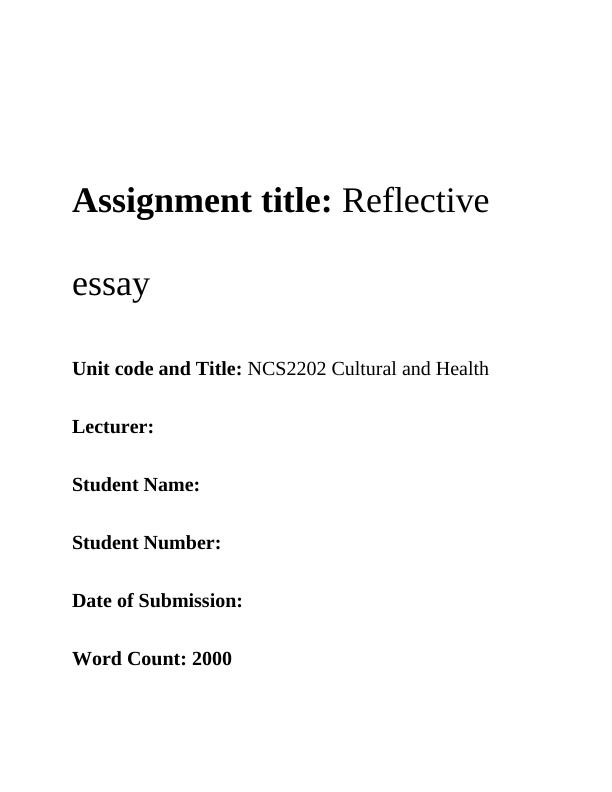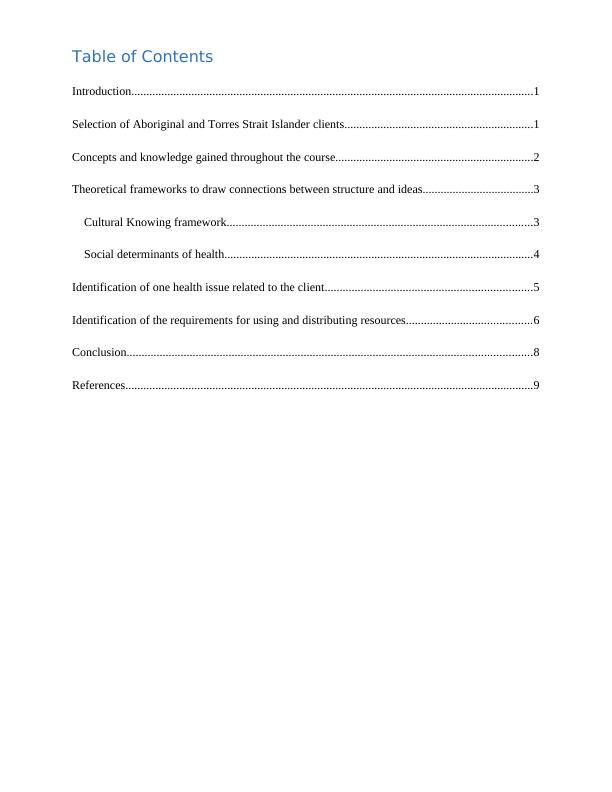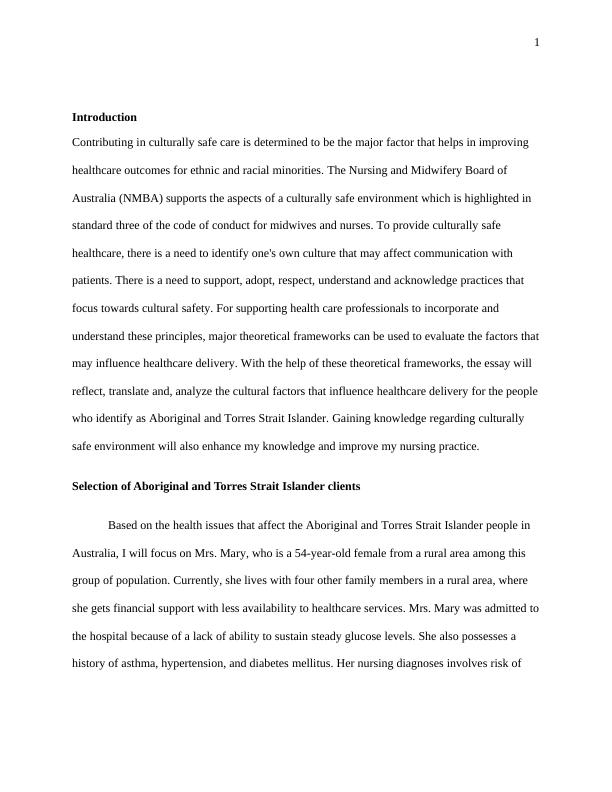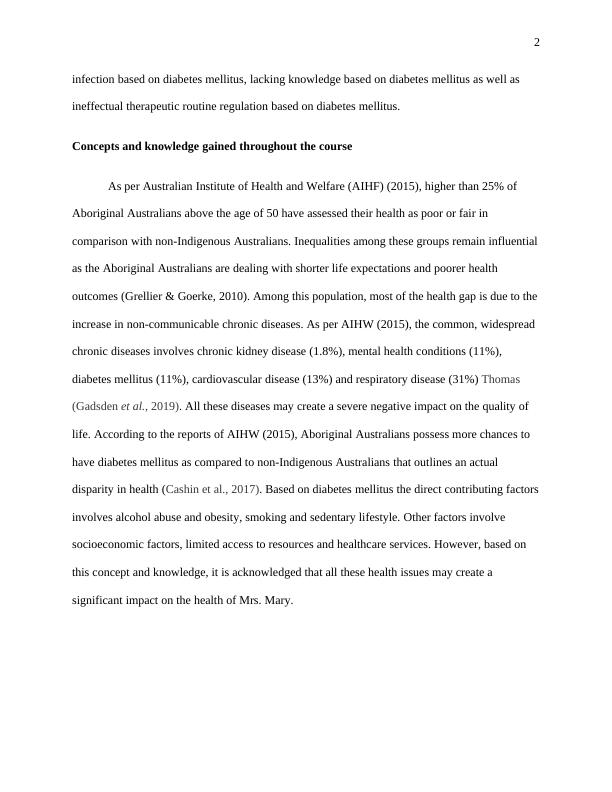Reflective Essay on Cultural Factors Influencing Healthcare Delivery for Aboriginal and Torres Strait Islander People
Added on 2022-10-31
13 Pages2980 Words167 Views
Assignment title: Reflective
essay
Unit code and Title: NCS2202 Cultural and Health
Lecturer:
Student Name:
Student Number:
Date of Submission:
Word Count: 2000
essay
Unit code and Title: NCS2202 Cultural and Health
Lecturer:
Student Name:
Student Number:
Date of Submission:
Word Count: 2000

Table of Contents
Introduction......................................................................................................................................1
Selection of Aboriginal and Torres Strait Islander clients...............................................................1
Concepts and knowledge gained throughout the course..................................................................2
Theoretical frameworks to draw connections between structure and ideas.....................................3
Cultural Knowing framework......................................................................................................3
Social determinants of health.......................................................................................................4
Identification of one health issue related to the client.....................................................................5
Identification of the requirements for using and distributing resources..........................................6
Conclusion.......................................................................................................................................8
References........................................................................................................................................9
Introduction......................................................................................................................................1
Selection of Aboriginal and Torres Strait Islander clients...............................................................1
Concepts and knowledge gained throughout the course..................................................................2
Theoretical frameworks to draw connections between structure and ideas.....................................3
Cultural Knowing framework......................................................................................................3
Social determinants of health.......................................................................................................4
Identification of one health issue related to the client.....................................................................5
Identification of the requirements for using and distributing resources..........................................6
Conclusion.......................................................................................................................................8
References........................................................................................................................................9

1
Introduction
Contributing in culturally safe care is determined to be the major factor that helps in improving
healthcare outcomes for ethnic and racial minorities. The Nursing and Midwifery Board of
Australia (NMBA) supports the aspects of a culturally safe environment which is highlighted in
standard three of the code of conduct for midwives and nurses. To provide culturally safe
healthcare, there is a need to identify one's own culture that may affect communication with
patients. There is a need to support, adopt, respect, understand and acknowledge practices that
focus towards cultural safety. For supporting health care professionals to incorporate and
understand these principles, major theoretical frameworks can be used to evaluate the factors that
may influence healthcare delivery. With the help of these theoretical frameworks, the essay will
reflect, translate and, analyze the cultural factors that influence healthcare delivery for the people
who identify as Aboriginal and Torres Strait Islander. Gaining knowledge regarding culturally
safe environment will also enhance my knowledge and improve my nursing practice.
Selection of Aboriginal and Torres Strait Islander clients
Based on the health issues that affect the Aboriginal and Torres Strait Islander people in
Australia, I will focus on Mrs. Mary, who is a 54-year-old female from a rural area among this
group of population. Currently, she lives with four other family members in a rural area, where
she gets financial support with less availability to healthcare services. Mrs. Mary was admitted to
the hospital because of a lack of ability to sustain steady glucose levels. She also possesses a
history of asthma, hypertension, and diabetes mellitus. Her nursing diagnoses involves risk of
Introduction
Contributing in culturally safe care is determined to be the major factor that helps in improving
healthcare outcomes for ethnic and racial minorities. The Nursing and Midwifery Board of
Australia (NMBA) supports the aspects of a culturally safe environment which is highlighted in
standard three of the code of conduct for midwives and nurses. To provide culturally safe
healthcare, there is a need to identify one's own culture that may affect communication with
patients. There is a need to support, adopt, respect, understand and acknowledge practices that
focus towards cultural safety. For supporting health care professionals to incorporate and
understand these principles, major theoretical frameworks can be used to evaluate the factors that
may influence healthcare delivery. With the help of these theoretical frameworks, the essay will
reflect, translate and, analyze the cultural factors that influence healthcare delivery for the people
who identify as Aboriginal and Torres Strait Islander. Gaining knowledge regarding culturally
safe environment will also enhance my knowledge and improve my nursing practice.
Selection of Aboriginal and Torres Strait Islander clients
Based on the health issues that affect the Aboriginal and Torres Strait Islander people in
Australia, I will focus on Mrs. Mary, who is a 54-year-old female from a rural area among this
group of population. Currently, she lives with four other family members in a rural area, where
she gets financial support with less availability to healthcare services. Mrs. Mary was admitted to
the hospital because of a lack of ability to sustain steady glucose levels. She also possesses a
history of asthma, hypertension, and diabetes mellitus. Her nursing diagnoses involves risk of

2
infection based on diabetes mellitus, lacking knowledge based on diabetes mellitus as well as
ineffectual therapeutic routine regulation based on diabetes mellitus.
Concepts and knowledge gained throughout the course
As per Australian Institute of Health and Welfare (AIHF) (2015), higher than 25% of
Aboriginal Australians above the age of 50 have assessed their health as poor or fair in
comparison with non-Indigenous Australians. Inequalities among these groups remain influential
as the Aboriginal Australians are dealing with shorter life expectations and poorer health
outcomes (Grellier & Goerke, 2010). Among this population, most of the health gap is due to the
increase in non-communicable chronic diseases. As per AIHW (2015), the common, widespread
chronic diseases involves chronic kidney disease (1.8%), mental health conditions (11%),
diabetes mellitus (11%), cardiovascular disease (13%) and respiratory disease (31%) Thomas
(Gadsden et al., 2019). All these diseases may create a severe negative impact on the quality of
life. According to the reports of AIHW (2015), Aboriginal Australians possess more chances to
have diabetes mellitus as compared to non-Indigenous Australians that outlines an actual
disparity in health (Cashin et al., 2017). Based on diabetes mellitus the direct contributing factors
involves alcohol abuse and obesity, smoking and sedentary lifestyle. Other factors involve
socioeconomic factors, limited access to resources and healthcare services. However, based on
this concept and knowledge, it is acknowledged that all these health issues may create a
significant impact on the health of Mrs. Mary.
infection based on diabetes mellitus, lacking knowledge based on diabetes mellitus as well as
ineffectual therapeutic routine regulation based on diabetes mellitus.
Concepts and knowledge gained throughout the course
As per Australian Institute of Health and Welfare (AIHF) (2015), higher than 25% of
Aboriginal Australians above the age of 50 have assessed their health as poor or fair in
comparison with non-Indigenous Australians. Inequalities among these groups remain influential
as the Aboriginal Australians are dealing with shorter life expectations and poorer health
outcomes (Grellier & Goerke, 2010). Among this population, most of the health gap is due to the
increase in non-communicable chronic diseases. As per AIHW (2015), the common, widespread
chronic diseases involves chronic kidney disease (1.8%), mental health conditions (11%),
diabetes mellitus (11%), cardiovascular disease (13%) and respiratory disease (31%) Thomas
(Gadsden et al., 2019). All these diseases may create a severe negative impact on the quality of
life. According to the reports of AIHW (2015), Aboriginal Australians possess more chances to
have diabetes mellitus as compared to non-Indigenous Australians that outlines an actual
disparity in health (Cashin et al., 2017). Based on diabetes mellitus the direct contributing factors
involves alcohol abuse and obesity, smoking and sedentary lifestyle. Other factors involve
socioeconomic factors, limited access to resources and healthcare services. However, based on
this concept and knowledge, it is acknowledged that all these health issues may create a
significant impact on the health of Mrs. Mary.

End of preview
Want to access all the pages? Upload your documents or become a member.
Related Documents
Culturally Safe Practice for Aboriginal and Torres Strait Islander Populationlg...
|13
|3474
|95
InTRODUCTION 3 MAIN BODY3: Culture and Health INTRODUCTION 3lg...
|10
|3239
|448
Cultural Safety in Healthcarelg...
|8
|2356
|201
How's Your Sugar? - Promoting Wellness and Education for Aboriginal Communitylg...
|13
|3068
|90
Diabetes Health Issue in Aboriginal and Torres Strait Islander Australianslg...
|14
|1762
|57
Social Determinants of Health (SDOH) in Australialg...
|16
|3844
|153
